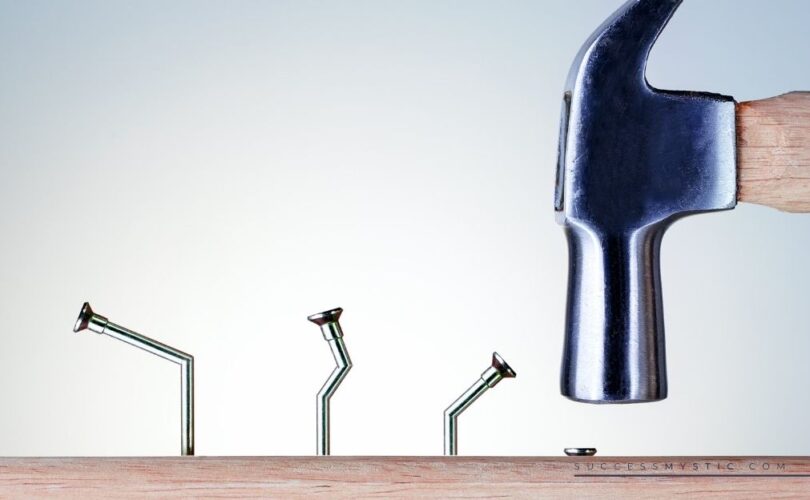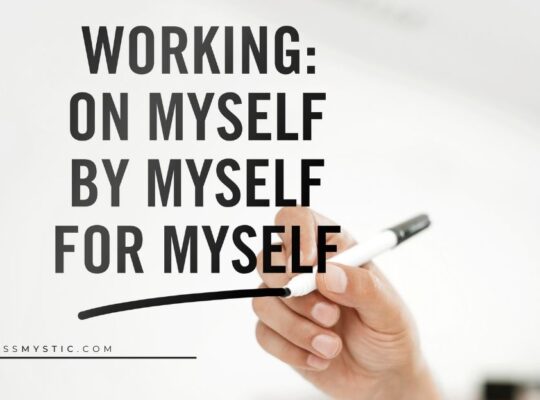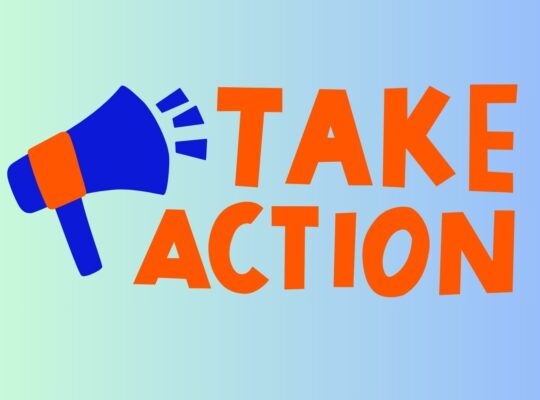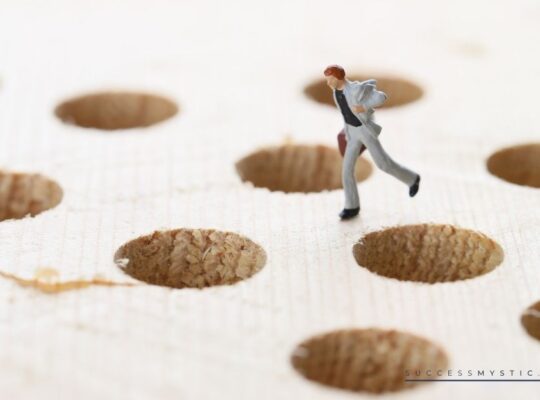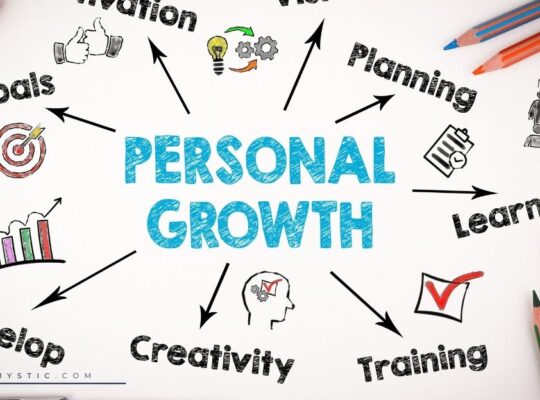In this article: It’s time to learn to learn from your mistakes and grab the golden opportunities that arises out of them. When you start learning from your mistakes, you realize that you have the power to learn from all the obstacles in your life.
If someone asked you to name the biggest mistakes you ever made in your life, chances are you could name those pretty quickly. Now, instead of considering what you did wrong, ask yourself this. What did you learn from those mistakes, and how did they make you the person you are today?
Mistakes can be valuable life lessons if you choose the right mindset and learn from your errors. It is how you view these experiences and the lessons from them that determines whether you will learn from your setbacks. Because mistakes are unavoidable, learning from these outcomes is the healthiest, most productive strategy you can adopt.
This guide explores the many ways you can learn valuable lessons from mistakes as well as how to get the most from these growth opportunities. We illustrate some of the most common life lessons that are learned through mistakes and give you concrete strategies for reframing your mindset to take advantage of errors in your personal growth and development.
Your Mindset Determines How You Deal with Mistakes
Your mindset is your attitude or outlook on the world. It is informed by your beliefs and past experiences. It starts forming when you are very young and evolves throughout your life. Your mindset influences how you see the world, yourself, and the various circumstances and choices in your life.
One of the ways that mindset determines your approach to mistakes is how it controls your self-esteem. When you believe yourself to be capable, resilient, and strong, you see challenges are opportunities to learn, and you embrace the possibilities they provide.
But, when you have little faith in yourself or believe yourself incapable of growing or changing, mistakes and challenges can be frightening and something you work to avoid.
Your mindset also plays a role in your motivation and effort. When you see a goal as important but challenging to attain, a more positive, growth-oriented mindset will help you stick with your efforts to achieve it, even when you encounter adversity or setbacks. A more negative, fixed mindset will tell you that it is not really worth all the effort and to simply give up in favor of something easier.
Whether you believe in yourself, your capabilities, and your worthiness of achieving your goals will all be important in how you handle the mistakes in your life. Only with healthy self-esteem can you grow, learn, and realize your full potential. It is through our errors in life that we discover things about ourselves we did not know before and that we find hidden talents and dreams.
When it comes to learning and personal growth, your mindset lies on a continuum. The two ends of this spectrum are fixed and growth. A fixed mindset believes that our talents and intelligence are innate, that we cannot change or improve these over time, and that the nature of success is to prove your talents to others.
The opposite end of this spectrum is the growth mindset, which believes that we can continue to learn, grow, and change throughout our lives and that we are capable of realizing our goals through effort, learning, and persistence.
When you have a fixed mindset, you may believe you were “born” to do a specific job or engage in a particular activity, and when your path is already determined, it becomes imperative that you show yourself and other people how good you are at your “fated” role. And because a fixed mindset believes intelligence is fixed, too, there is little incentive to work hard or set big goals for yourself because you are already good enough, right?
As you can see, this way of thinking conflicts with the ideals of learning and personal growth. A growth mindset, which focuses on continuous improvement and evolution throughout one’s life, allows you to change your path, to develop new talents, to realize your untapped potential, and to change careers or hobbies whenever you may want.
The growth mindset allows you to see more possibilities in the world, including those that are represented through mistakes, challenges, and failures. Even when things go badly, there is still something to learn and a lesson that can make you a stronger, more successful person in the future. Unlike a fixed mindset, which narrows your thinking, focusing on growth broadens it to include what you can learn from even the darkest times in your life.
What We’ve Been Taught About Mistakes
For most of us, mistakes have gotten a terrible reputation most of our lives. We are taught from an early age to avoid making mistakes, that mistakes are bad, that when you mess up you will be criticized, and that errors can cause embarrassment, harm, or something even worse.
While it is true that some mistakes, like drunk driving, can have dire consequences, most of the mistakes we make in our lives are not life or death, and yet we fear them as if they are.
Part of parenting is teaching kids what to do and what not to do, so kids hear a lot of messages about what they did wrong. But there is very little explanation as to the consequences of these mistakes, so we grow up only thinking mistakes are wrong, so we should not make them.
More and more, also, parenting has come to mean protecting children from everything. While this may sound correct, imagine an 18-year-old about to graduate from high school who has never had to live with the consequences of any mistake he or she has ever made because his or her parents have shielded and protected them from these outcomes?
While it may seem far-fetched, the reality is not far off for some people today. Helicopter and bulldozer parents are raising a generation of youngsters who are not allowed to fail and who never have to realize the consequences of their actions.
All of this plus a societal obsession with looking good, projecting the right image, keeping up with one another, and “winning” means that we hide our mistakes, we deny them or blame others for them, or we get eaten up with guilt over the mistakes of our past. All this negativity surrounds what could be viewed in a vastly different light, which is how mistakes actually have a lot to teach us.
8 Valuable Lessons Taught By Mistakes
Still not convinced mistakes are helpful? Take a look at these critical life lessons that you can glean from the mistakes you make.
Learn to Accept Yourself Through Mistakes
When you mess up in life, it is because you are flawed and imperfect. Everyone is. The world is. But just because you make a mistake does not mean you are not worthy of love from yourself or others. Learning to appreciate yourself not just despite but because of your mistakes is a real gift.
You can learn more about yourself, about your beliefs and patterns of behavior, and about how you treat yourself and others by paying attention to the mistakes you make.
And you can also learn to accept that other people will keep loving you, even when you mess up in significant ways. Mistakes are part of being unique and different, which is something you should value instead of trying to hide or deny.
Figure Out What Works and Doesn’t
Mistakes are merely data points. They are information that we gain about what was and what was not successful. They are feedback. When you learn to analyze your mistakes, you see that they are a goldmine of information that you can use to inform your next attempt at solving a problem or reaching a goal.
After you mess up, you have a ton of information that you did not before that can help you formulate a new, more successful plan. Feedback from mistakes is often extremely specific to your current situation, which is great for making adjustments that can help keep you on course.
Correct Poor Behavior
When you see that you have messed up or that things are not turning out as you wanted, you can use that information to change a bad habit that is contributing to the problem. Maybe your procrastination is what cost you a promotion. Perhaps your poor communication is harming your relationship. When you see errors and how they are affecting your life, it can be a wake-up call that you need to make some changes to your habits.
Mistakes Can Clarify Your Goals
Something is a mistake when it is a mismatch with what we really want. So, for example, if you do something that others find to be “wrong,” but you find yourself not caring, it tells you that you do not value this in the same way that others do.
When you notice that you care a lot about something that is not going well, that tells you that you care a lot, that you need to remedy this so that things are okay and that your goals and values are protected. Paying attention to what you view as “mistakes” and those you do not care about can help uncover what is important to you, which can clarify your larger goals in life, too.
Mistakes Teach You Resiliency
The challenges we face in life, including those of our own making, are what help us develop grit and determination. When you make a mistake, you have to find a way to fix what went wrong, which requires you to think about possible solutions, to stick with it until you resolve the problem, and to push on despite feeling embarrassed or upset.
These are all traits necessary for becoming more resilient, which is your ability to overcome obstacles in life. The more mistakes you make, the easier it is to overcome these setbacks, and the more information you will have to help avoid these errors in the future.
Mistakes Help You Face Your Fears
Some mistakes can’t be undone or fixed. When you break something irreplaceable or damage the trust between friends, for example, things will never be the same as they were before, despite your best efforts. Some mistakes result in failure, which is something many of us fear more than anything.
Facing defeat is a prospect so scary thot some will avoid trying or taking risks so they can’t possibly fail. By learning to accept that mistakes happen, and they are a part of life, you can learn to let go of your fear of failure and instead focus on what you can learn from all mistakes, even those with the worst kinds of outcomes.
Learn to Accept Responsibility
When you focus on what you can learn from your mistakes, you accept that you are responsible for your actions and choices. Instead of blaming others or denying your role, the right mindset about mistakes helps you accept that you played a role in the situation, that your mistake may have harmed others, and that you must take responsibility not only for the mistake but how you will correct the error.
Mistakes Can Teach You How to Have Integrity
There are many reasons mistakes occur, and sometimes they are due to our own poor choices and habits. When you over-commit, break your promises, lie to others, fail to communicate well, or practice avoidance behaviors, errors will happen that you could have avoided.
And many mistakes in life occur because of a build-up of smaller errors. When you see that your actions or choices led to these outcomes, you have an opportunity to own your part in the situation and make appropriate changes, or you can simply go on repeating your actions. Those who learn from their mistakes develop integrity by paying closer attention to their daily activities and how they influence others as well as their goals.
Making Mistakes Allows You to Live a Fuller Life
When you work hard to avoid making mistakes, you stop taking chances, trying new things, or being open to new possibilities. No one is getting out of this life free from errors, failure, or adversity, and the sooner you realize this, the more you can start making choices about what you want instead of what you fear.
Learning from your mistakes helps you see them as valuable, which means you will not mind making more of them if it means living a life free from fear.
What Happens When You Dwell on Your Mistakes
Unlike learning from your mistakes, which means you analyze the lessons you can learn and use those to productively move forward, some people choose to live in the past, dwelling on their mistakes for extended periods. While they may try to convince themselves and others that this is a way for them to learn from what went wrong, this type of behavior is unhealthy for several reasons.
Living in the past and dwelling upon your mistakes adversely influences your self-confidence. Whereas a growth mindset helps you see what is positive about a setback, rumination simply focuses on what you did wrong, which can lead to an erosion of your self-esteem.
Because dwelling in the past is not productive, it perpetuates a cycle of negative emotions that can lead to destructive behaviors and the growth of emotions like fear, anger, and jealousy.
Living in the past also makes it more likely that you will avoid present reality with negative behaviors. These self-sabotaging actions include procrastination, denial, and perfectionism, which can derail your progress toward personal growth and learning.
Those who dwell on the mistakes of the past often live in fear of future challenges or with constant anxiety about making more mistakes. This cycle of stress leads to mental and physical problems that can harm your overall well-being.
Instead of dwelling on the past, it is time to learn from it and move on. The most important part of looking back at your mistakes is taking the lessons you can learn and applying them to your life now so that those mistakes were not in vain.
10 Ways to Turn Mistakes Into Opportunities for Growth
The following are strategies and tips for how to learn from the mistakes you make in your life. Some are more universal to all types of errors, while others may be specific to certain kinds of problems. Choose those that fit your situation best.
1| Own Your Role or Mistake
The first step to learning from any mistake you make in life is first admitting what you did. Some mistakes only need to be revealed to yourself but, if it affects other people, you need to take ownership of them, as well. It is not easy, especially when it is a significant error, but owning your mistake is crucial if you want to be able to turn this into a productive lesson.
When your mistake affects others, be sure to apologize and let them know that you are working on a resolution, too. The sooner you own your mistake and take control over the situation, the sooner you can try to make it more productive and create a favorable outcome, so do not live in denial or try to blame others.
2| Stop Negative Self-Talk
When you mess up, your mind may be the first to start berating you and telling how stupid you are for making a mistake to begin with. This type of negative self-talk is highly unproductive and does nothing to solve the problem. Silence that inner voice the second it starts its complaining. Push it aside in favor of questions you can ask about what you can learn. Focus on actions and solutions rather than complaints and tirades.
3| Focus on Analyzing What Went Wrong
Analysis of your mistakes is crucial to learning the most you can from the situation. First start with what you were trying to accomplish. Knowing your goal is essential. Then, look at what you tried to do.
What went wrong there? When and why did it go off track?
Determine the specific action or step where the mistake was made. Was there an error, did one thing trigger a series of events, was bad behavior to blame? Consider all the factors, including how your own habits may have led to the problem.
4| Look for Flaws in Your Thinking
Sometimes the mistake was not in what you did but in how you thought about a situation or solution. Look back at the beginning of the situation at what you were hoping and expecting to happen.
Why did you believe this?
What did you imagine happening, and how did that differ from reality?
Often, our initial thinking is flawed, which leads to wrong assumptions about what will work or the best way to solve a problem. Asking questions about why you thought certain things or believed specific outcomes would happen can be extremely helpful when figuring out the cause of a mistake.
Consider if your thinking was reasonable, if your goal was attainable, if your assumptions were correct, or if your chosen strategies made sense for the situation.
5| Make a New Plan and Put it Into Action
You have not actually learned from your mistakes until you do something with the knowledge you have gained from this reflective process. It is time to try a new solution, to do something to rectify or make amends to others, or to try again to accomplish your goal.
Do not wait around for the right time, either! Do it as soon as you figure out the next, best step. The sooner you act, the sooner you can make what when wrong right again.
6| Get Advice on Hard-to-Solve Problems
When you make a mistake, it could be because you lack the knowledge or skills to execute a plan in the first place. Or, you may not be able to solve the problem on your own, which is why you stumbled.
Getting help from others is a great solution and can give you perspectives that you may not see. Asking others to help you analyze what happened or consider options for solutions can be incredibly enlightening and can teach you something new, as well.
7| Get Rid of Bad Habits
Many times, our mistakes are due to poor personal habits we have developed over time. For example, when you are always running late, you tend to be unprepared for important events or meetings. When you have a habit of zoning out, you miss crucial information that could help you avoid mistakes.
When you are disorganized, you lose track of vital details that could help you avoid problems. Analyze your personal habits to see if some are contributing to minor or not-so-minor mistakes in your life and make a plan for how you will change these for the better.
8| Move Past Your Self-Doubts
When you make a mistake, especially ones that affect other people, it is normal that you might start to question your own capabilities or talent. But, wallowing in this doubt is not helpful.
You must express your feelings of doubt and process them, but then focus on what you can do to get back on track. Remember the difference between learning from the past and dwelling on it and use your energy to focus on what is to be learned from your misfortune.
9| Remember to Laugh at Yourself
Finding humor in tricky situations is also extremely helpful. When you make a mistake, it can be very funny, and learning to laugh at yourself means that you do not take things so seriously that you can’t learn and grow from even the most embarrassing blunders.
When you find humor in a mistake, you can see your flawed thinking or assumptions and realize the error of your behavior. You probably laugh when others share their “oops” moments, so why not laugh at yours, as well?
10| Remember that Mistakes are Inevitable
When you embrace a growth mindset, you realize that mistakes, setbacks, and even failures are part of what makes life interesting and unpredictable. You can’t control them, so you should not waste your time worrying over things that have not happened, or that may never come true.
When you start learning from your mistakes, you realize that you have the power to learn from all the obstacles in your life, including more significant ones, which means you can stop fearing those unknown future events and start living your life to its fullest.
Final Thoughts
Learning from your mistakes is a hard life lesson, but one that will prove invaluable once you master it.
To recap, here are the things you can do to help you learn from those errors you will make in life.
- Accept responsible for your mistakes.
- Remember that making a mistake something you do, not something you are.
- You cannot control everything, but you can control how you respond.
- There is always room for improvement.
- Look carefully at what happened and why.
- Examine your behaviors as well as your beliefs.
- Put a new plan into place that incorporates your new understanding
- Make changes to your habits that will prevent future mistakes.
- Be honest with yourself and others about your errors.
- Look at mistakes as a way to learn rather than an obstacle to overcome.
Adopting a growth mindset can help you embrace the mistakes, challenges, and adversities you will face in your life and use them to fuel your personal growth and development.

